This continues, and concludes a series of items on Vendor Neutral FLOSS projects and how they do marketing which you can read here.
TDF / LibreOffice Branding
If we want to grow our community, and to drive this with marketing – we need to position our brands to make this easy and ideally unconscious. Currently we have two brands, taking the descriptions from their websites:
- LibreOffice is Free and Open Source Software Development is open to new talent and new ideas, and our software is tested and used daily by a large and devoted user community (link).
- ie. it is pretty clear: 'LibreOffice' is software.
- The Document Foundation - It is an independent
self-governing meritocratic entity, created by a large
group of Free Software advocates, in the form of a charitable
Foundation under German law (gemeinnützige rechtsfähige
Stiftung des bürgerlichen Rechts). (link).
- ie. it is clear this is a Stiftung – and by association / default comes to also mean the handful of employees who comprise the paid team there with some oversight from the board.
Unfortunately – it seems we have two brands, and neither of these means “The community”, or “The people who do most of the hard work”. These are the people we need to be encouraging, recruiting, building up, and talking about. The degree to which TDF’s paid staff represent ‘the community’ is unclear. The board is elected to represent the community, and oversees TDF but is also not itself the community (but the board). When TDF says “our software” - how can we ensure that everyone feels included in that ‘our’ ?
It seems clear that we need to solve this dis-connection with some formulation, strap-line, brand or form of words that we use to highlight and emphasize our contributor’s input – and use this repeatedly.
LibreOffice vs. Commercial branding
Branding is really important as we have seen: shipping identical software, at the same price in the Mac app store with just the LibreOffice vs. Collabora Office brand changed shows – that the LibreOffice brand is simply far better known & sought after gathering the overwhelming majority of interest. This however brings a problem – if development work is funded by leads generated from brands then TDF promoting eg. LibreOffice Online under its own brand can easily radically impair leads, investment and thus code-flows into LibreOffice Online without any offsetting advantage. The picture below compares two branding approaches for the 95%+ of commits that Collabora has put into LibreOffice Online. The 0.05% is the proportion of visitors to LibreOffice that discover that they should fund development buying professional services (from anyone) – as we shall see below.
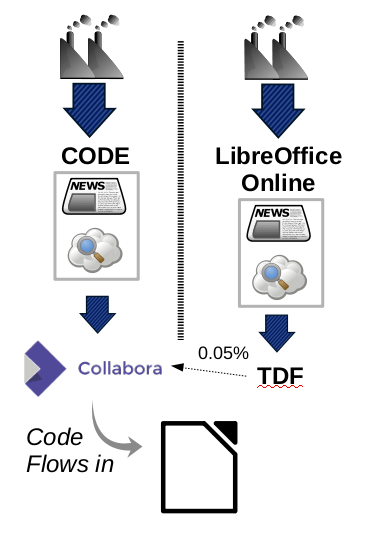
TDF marketing in practice
How does LibreOffice get marketed from this perspective ? How do companies get leads from TDF so that they can sell to some fraction of them their products, support & services thus allowing re-investment back into LibreOffice ? Answer: very poorly. Recently we’ve done a better job of telling people about LibreOffice, a recent release announcement says:
"LibreOffice 6.1’s new features have been developed by a large community of code contributors: 72% of commits are from developers employed by companies sitting in the Advisory Board like Collabora, Red Hat and CIB and by other contributors such as SIL and Pardus, and 28% are from individual volunteers."
and also encourages people to use an LTS version – which is not itself provided by TDF – which is a major improvement:
"For any enterprise class deployment, TDF maintains the more mature LibreOffice 6.0, which should be sourced from a company providing a Long Term Supported version of the suite (they are all members of TDF Advisory Board, and are listed here: http://www.documentfoundation.org/governance/advisory-board/)."
However the website still has a large number of issues in this area, investing nominal fees into Advisory Board membership is a marginal contribution vs. the substantial investments into the software & community. A better approach is the single page that educates users about the availability of professional services – which is the get-help/professional-support/ page which highlights certified competent migraators, trainers and developers. So how does this hero list of contributors to LibreOffice's success fare when people visit our site, lets see by checking out the metrics on page visits:
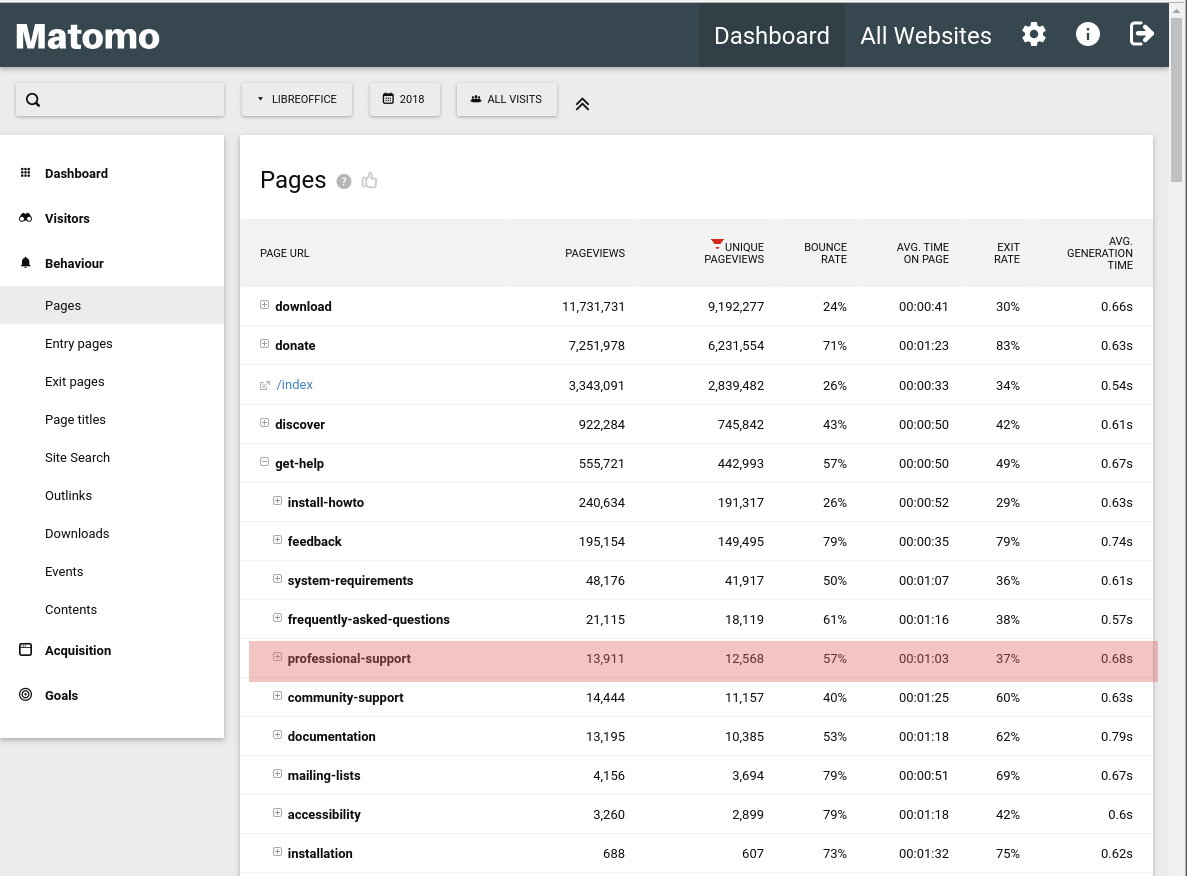
It is interesting to see that those interested in professional support – only around 4700 this year (1/3rd of 13000) exited to either close the session, or visit a supported version provider. The bounce rate suggests that the majority of people arrive on the professional support page from elsewhere, and not TDF’s own properties. This matches with what is seen by vendors analyzing what arrives from TDF. Compared with the total visits as of (2018-09-07):
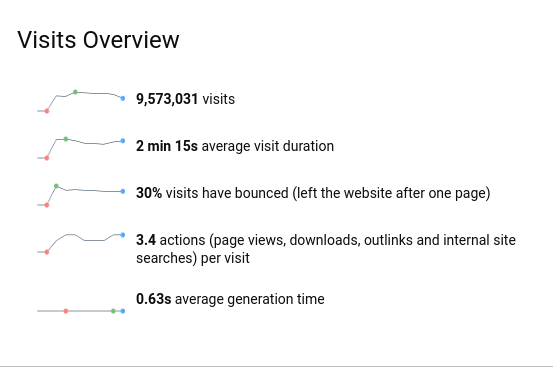
the number of people exiting to find professional service from that page is 0.05% of our 9.5 million visitors so far.
The contrast between the "Economic and code contribution flows in today's ecosystem" and even the helpful description in the 6.1 release marketing acknowledging 72% of commits, compared with the 0.05% actual click-through rate is extraordinarily stark. It seems clear that our users are not being educated as to the importance of supporting the certified ecosystem - certainly in the area of code, but almost certainly also in other certified areas such as training & migration.
Visualizing 0.05%
This is rather a tricky task – it rapidly turns into something like visualizing the geometry and distances of the solar system. Two charts are shown – a pie chart with the corporate contribution to the code in commits – and a crop to the center of another showing the flow of people clicking through the page to find professional services which go to 1improve LibreOffice (in blue) and others in red:
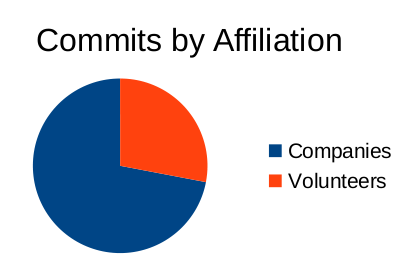

It is of course unclear what %age of our visitors are enterprises and thus should be encouraged to seek professional help, however 0.05% seems an implausibly low fraction by perhaps two orders of magnitude.
Marketing – Product expectations
Another side-effect of majoring on LibreOffice as a free, always and forever and for everyone free, no catches, product – is creating mistaken expectations in our users around how the relationship works. Here is a simple example mail from 2018-04-19:
“Please help me to installLibreOffice at Lubuntu17 my donation number via PayPal is 1TV07632F2376242R”
Apparently the donor believes there is some connection between his donation and installation support, despite our donate page being quite explicit that this is not so. This is buttressed by rather regular E-mails of the form I made my donation, but still can't download it - apparently people love to miss the LibreOffice is Free Software and is made available free of charge. Your donation, which is purely optional, supports our worldwide community. text there.
This example is relatively friendly. Some chunk of user interactions are much less friendly – criticizing the product, attacking the project for not fixing their particular issue on their timeline, or investing in their particular problem. A peripheral, but amusing pathology is of users from time to time augmenting the urgency of a request by generously offering a $50 donation to TDF to cover the (often) multiple-person-week of (pet) feature work needed.
By setting a more realistic expectation around support, enterprise suitability , and particularly by encouraging people on our main properties to contribute – it is possible to build a consumer, community brand – rather than a pure product brand. This may have a positive impact on reducing the feeling of entitlement that some of our users have.
Similarly enterprises deploy the wrong software, without support, fail to keep it up-to-date, and then believe that we are responsible for helping them, a recent mail to the security list highlights this, names removed to protect the mislead:
Subject: Security issues within Libre Office My Company, XXXXX, uses the latest ( I think ) version of Libre Office. We also use the Qualys tool for security Compliance. It has found a vulnerability with Libre Office. Are you familiar with this, And how do I remediate your application? ... signature reads ... FORTUNE Magazine World's Most Admired Companies® 2014|2015|2016|2017|2018
A kind reply, funded by RedHat’s formidable security investment:
It might be that its already fixed in the latest stable release, or its a false positive, or even something that remains to be fixed, but we'd need more information to judge.
And then we find out:
The version we have is: C:\Program Files (x86)\LibreOffice 4\program\soffice.exe Version is 4.2.0.4 Have you found similar vulnerabilites? Is there a newer version that we can download and test against the above reported vulnerabilities.
They use a version that is four years old today, and this is from a significant company, saving plenty of money and apparently investing nothing – instead, consuming time from those who are. Far from an isolated example, some of them are ruder with a more explicit sense of entitlement.
Our marketing – setting expectations
The software industry is an industry typically driven by hype, where software startup marketing has this rather ‘visionary’ approach, something like:
| Text: | "Look at this awesome product (demo), come and buy it !" |
| Sub-text: | “so when you bought it we can fund actually delivering the product.” |
This could be called the Sagrada Familia model, as long as people know this is what they’re buying it has a certain logic. Arguably TDF’s current marketing has a leaning towards:
| Text: | “Look at this awesome product, come get it for free !” |
| Sub-text: | “we’ll work out how to get people to contribute to fully deliver on our promise of awesomeness sometime later” |
Almost certainly a more helpful marketing approach might be:
| Text: | “Join our awesome project and contributors to improve our great product” |
| Sub-text: | “community should be fun, and we need to grow it, we’re here to promote you if you contribute.” |
The experience of selling a supported LibreOffice
Against this – the experience of selling a supported version of LibreOffice is hard. LibreOffice has a powerful brand, and it is associated with everything being free as in beer. Some small subset of our community appear to believe that building product brands and businesses around LibreOffice is non-ideal, and that we should focus on providing ever more services free to enterprises. The perception that the ‘genuine’ version is LibreOffice from TDF is real one, and stoked by the lack of systematic acknowledgment of the great benefits provided by the ecosystem.
Contributors are sometimes deeply emotionally attached to the project, and the LibreOffice brand and feel that to promote an alternative brand, even if in doing so that helps fund the work, is some sort of betrayal – or lack of neutrality. This sometimes extends to being eager to duplicate functionality, packaging, documentation etc. simply to re-brand it to LibreOffice.
This too is profoundly unfortunate. Others believe that FLOSS is fundamentally identified with a zero per-seat cost – perhaps plus some consultancy (perhaps installation, or some migration support), and that having no SLA, and letting others fund long term product investment is the only sensible approach to choose: maximising their apparent saving. Discussions with such parties are quite interesting – often oscillating between variants of: “I should pay nothing per seat because its FLOSS”, and “The product is not yet quite good enough for us – you must fix it for free before we [don't] buy your product”.
It would be good to have TDF’s explicit support for selling branded support services and versions around LibreOffice to make this more socially obvious to those who are not members of our community.
Conclusions
The commercial ecosystem around LibreOffice is an un-necessarily tough environment to operate in. Companies contribute a large proportion of the work, and yet get very little acknowledgement – which in turn makes it hard for them to invest. This also creates an un-necessary tension with companies marketing – which has to focus on building their own brands. Companies should not fear the arrival of the LibreOffice brand to squash, claim credit for, and present their work as created by someone else – thus effectively depriving them of leads. This is unsustainable.
The LibreOffice project should give a new focus to promoting and celebrating all participants in its community – including ecosystem companies. This is far from a problem unique to companies. It is routinely the case that individual community members feel under-appreciated – they would like more recognition of their work, and promotion of their own personal public brands as valued contributors. This is something that TDF should re-balance its marketing resource into, in preference to product marketing.
The LibreOffice project should explicitly create space for enterprise distributions by explicitly pointing out the weaknesses of LibreOffice for enterprises on its hot marketing properties. This would have a positive effect of encouraging companies to acknowledge and build the LibreOffice brand safe in the knowledge that anyone visiting LibreOffice will get an accurate and balanced picture of their skills and contribution.
We badly need to increase diverse investment into our ecosystem by building an environment where deep investment into LibreOffice is a sound economic choice: economics ultimately drives ecosystem behavior. By creating the right environment – often not by acting, but by clearly and deliberately not acting in a space – we can build a virtuous circle of investment that produces ever better software that meets TDF’s mission.
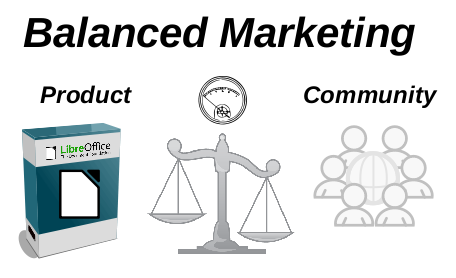
It has been said that in life - "You can either achieve things, or get the credit". Unfortunately, in the world of FLOSS – in order to sustainably achieve things you need to get the credit (and associated leads and hence sales). During the early creation of the project it was strategically necessary to under-emphasize corporate involvement, particularly of SUSE heavy lifting – but these days are long past. Similarly, we need to build a brand or formulation that stands for all volunteer contributors to LibreOffice and acknowledge these fulsomely.
This is the state of play today in the LibreOffice world, but the good news is, this is just the background for a series of positive discussions and suggested actions to re-balance TDF's marketing. No significant change is proposed to our development process, timeline, branching etc. I believe most of these are common-sense, and should be supported by the majority of the outside community, as well as those involved with the project - who have a more intuitive feel of the balance here. Some suggestions may be relevant to vendor neutral non-profits; but most are specific to LibreOffice. My plan is to post those suggestions to our public Marketing list and to have an open discussion there of how best to balance this. Potentially I'll add a summary here later.
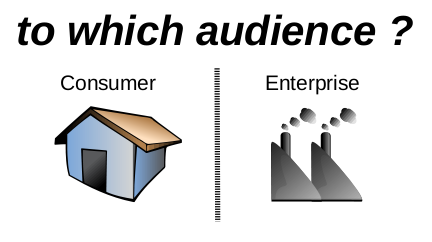
Thanks for reading - perhaps this may help some other communities improve their ecosystems too. For those interested in the source for my drawings they are available
Postscript to marketers
This paper has focused heavily on ways to improve our marketing and messaging. If you read this far – thank you ! It should in no way be read as a personal critique of people doing our marketing. Our existing positioning and approach and direction is something that has accumulated over many years, and all in leadership in the project are responsible for where we are at now. If you work in marketiing – thank-you for all you do, and the many positive messages that get out. Hopefully with some adjustments we can grow the project in exciting new directions at some large multiple of its current trajectory for the benefit of all.
This way – I hope we can meet the dream of gaining wider acceptance in the enterprise market.
